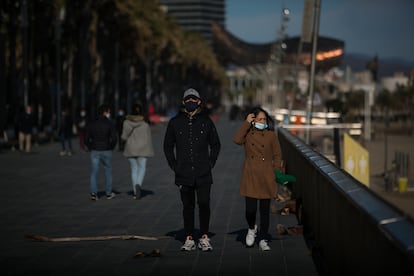Health Ministry reports 14,000 new coronavirus infections, adds 320 victims to overall death toll
The 14-day cumulative number of cases per 100,000 inhabitants is once again above the 250-mark, considered to be extreme risk by the Spanish authorities


As the Covid-19 vaccination drive gets started in Spain, the pandemic is not letting up. The Health Ministry on Tuesday reported 14,000 new confirmed infections and added 320 fatalities to the overall death toll. The fall in the 14-day cumulative number of coronavirus cases per 100,000 inhabitants on Monday was short lived, and the data point is now at 255, once again above the 250-mark that is considered to be extreme risk by the Health Ministry. The pressure on Spanish hospitals, meanwhile, remains high, with 12,000 Covid-19 patients currently receiving treatment, 2,000 of them in intensive care units (ICUs).
Catalonia opted on Monday to maintain its current measures saying that they “are already very drastic”
Infections are on the rise in all regions, apart from Andalusia and Cantabria, where the incidence has fallen slightly. Six regions have a 14-day cumulative number of coronavirus cases per 100,000 inhabitants above 250, although the worst situation is in the Balearics, which has doubled that limit. The islands currently have a rate of 522, which has prompted the authorities there to ramp up the social restrictions ahead of the New Year. Stores and restaurants will have to close at 6pm – apart from those selling essential products – on the island of Mallorca, which has a cumulative number of 607 cases per 100,000 inhabitants over a two-week period.
Cantabria, which has a cumulative number of 157 cases per 100,000 inhabitants, has also ramped up its coronavirus restrictions, limiting social meetings to six people on New Year’s Eve and January 1, while a curfew will be in place at 12.30am. Other regions, meanwhile, have opted to maintain their current restrictions despite the rise in cases and pressure on hospitals. Catalonia, for example, which has seen the proportion of Covid patients rise 14% in 10 days, opted on Monday to maintain its current measures saying that they “are already very drastic.”
The latest figures clearly show, however, a growth in the circulation of the virus across Spain and as such a rise in infections. In the Valencia region, for example, new contagions have shot up with the second highest numbers of infections and deaths ever seen, at 3,590 and 60, respectively. The 14-day cumulative number of coronavirus cases per 100,000 inhabitants in this region is currently at 364, only behind the Balearics and Extremadura (422).
The increase in infections, which can be linked to the relaxation of coronavirus restrictions at the start of December, is having an effect in Spain’s hospitals, which, with already high occupation levels, are holding their breath ahead of the threat of a possible third wave after the Christmas holidays.
According to the latest report, 10% of hospital beds (12,032 in total) are occupied by Covid-19 patients. Of these, 2,005 are in the ICU, 21% of the total. There are regions, however, which are suffering more than others, such as the Balearic Islands, which is now near to 30% occupation with Covid-19 patients, and Madrid, which is hovering around 25% occupation. A third of ICU beds in Catalonia are also being used to treat people infected with the coronavirus.
As has been seen during the pandemic so far, a rise in infections followed by a spike in hospitalizations has a domino effect on the number of fatalities. There were 320 Covid-related deaths added to the overall total on Tuesday, with more than 500 reported over the last seven days. Since the start of the pandemic, the Spanish Health Ministry has recorded 50,500 official victims, although the real total is likely to be much higher due to the high numbers of victims who passed away before being tested during the first wave.
English version by Simon Hunter.
Tu suscripción se está usando en otro dispositivo
¿Quieres añadir otro usuario a tu suscripción?
Si continúas leyendo en este dispositivo, no se podrá leer en el otro.
FlechaTu suscripción se está usando en otro dispositivo y solo puedes acceder a EL PAÍS desde un dispositivo a la vez.
Si quieres compartir tu cuenta, cambia tu suscripción a la modalidad Premium, así podrás añadir otro usuario. Cada uno accederá con su propia cuenta de email, lo que os permitirá personalizar vuestra experiencia en EL PAÍS.
¿Tienes una suscripción de empresa? Accede aquí para contratar más cuentas.
En el caso de no saber quién está usando tu cuenta, te recomendamos cambiar tu contraseña aquí.
Si decides continuar compartiendo tu cuenta, este mensaje se mostrará en tu dispositivo y en el de la otra persona que está usando tu cuenta de forma indefinida, afectando a tu experiencia de lectura. Puedes consultar aquí los términos y condiciones de la suscripción digital.








































